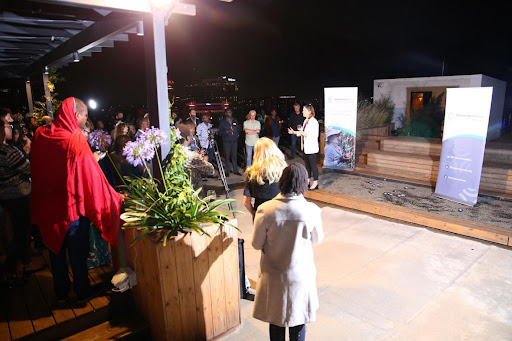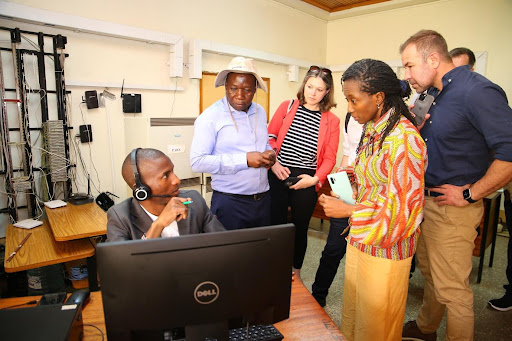TomorrowNow interacts with key stakeholders and smallholder farmers in Kenya as part of its commitment to lift the voice of farmers and address the urgent need for inclusive climate action enabled by farmer-first weather intelligence.
Nairobi, Kenya – TomorrowNow conducted a scoping mission in Kenya to interact with key stakeholders and smallholder farmers as part of its commitment to address the urgent need for inclusive climate action enabled by farmer-first weather intelligence.
The scoping mission served to engage existing and new partners that have been working in East Africa and to do a soft launch for Project Osiris alongside a team from the Bill & Melinda Gates Foundation.
“Project Osiris is here to democratize resilient seed breeding through the power of innovative weather assets and tools across East Africa” – Philip Frost (TomorrowNow’s Director of Agricultural Climate Resilience & Project Osiris Lead)
At the core of the mission was to learn from and with smallholder farmers in Machakos and Kiambu counties about how best they can participate in building a climate action system that’s founded on their individual needs and experiences dealing with climate change and adverse weather.
Some of the key organizations and stakeholders that were engaged in the mission include: Kenya Livestock and Research Organization (KALRO), Kenya Meteorological Department (KMD), Ministry of Environment and Forestry. Kenya Red Cross, IGAD Climate Prediction & Applications Center (ICPAC), Pan-Africa Bean Research Alliance (PABRA), The International Center for Tropical Agriculture (CIAT), World Bank, Kenya Space Agency, Mercy Corps AgriFin, World Vegetable Center Eastern & Southern Africa.
The scoping mission culminated in a Climate Innovation and Action Stakeholder Event held in Nairobi, Kenya. The networking event convened local and international game-changers to celebrate existing contributions to climate action and to spark new conversations and partnerships.

To name a few, here are some of the organizations that were represented at the event: Bill & Melinda Gates Foundation, Mercy Corps, ICPAC, World Bank, Kenya Meteorological Department, Kenya Space Agency, International Potato Center, AGRA, SunCulture, CGIAR, World Vegetable Center, Maasai Center for Regenerative Pastoralism, PULA, Cropnuts Labs and others.
Key Learnings
TomorrowNow team, partners and supporters made interesting findings that were pivotal in establishing a plan about how EVERYONE can work together to deliver farmer-centered solutions through innovation and partnerships.
URGENCY:
“The main challenge that we are facing is unreliable weather information” – Farmer Alex.
There’s an urgent need for advanced weather services that’s driven by participatory initiatives involving farmers, emergency responders, and government agencies.
We learnt from the farmers that weather affects their yields as well as various aspects of their daily activities, including cropping calendars, and fertilizer application. Wind and precipitation have a significant influence on their decision-making process especially when choosing the right crop to plant at the right time.
Yet 5 billion people still live outside radar coverage and this challenge is contributing to the current vulnerability of communities to weather and climate-related events. The problem of poor weather forecasting infrastructure is compounded by bottlenecks in weather information dissemination as evidenced by the fact that most farmers are not able to turn forecasts into action.
OPPORTUNITY:
“TomorrowNow was created to democratize the technology that’s already being generated to improve how we predict weather. Our strategy is to bring the voice of the farmer in developing weather & climate innovations” – Georgina Campbell Flatter (Executive Director of TomorrowNow)
Kenya has a robust agricultural ecosystem with many beneficiaries who see the value in advanced weather services as evidenced by the mix of bustling entrepreneurship and a significantly large population with access to technology – this is critical for market scalability. The willingness by the locals to participate in building an inclusive climate action system, coupled with their understanding of gaps/needs/opportunities is an important recipe for success. The public sector has also shown keen interest to partner and lead change together as enabled by a favourable regulatory environment.
Importantly, TomorrowNow enjoys good relations with various players and internal champions within government, NGO and private sector circles. We acknowledge the importance of engaging like-minded organizations and agencies to ensure that the end user, the farmer, benefits from the solutions we generate.

SUSTAINABILITY:
“We need to pull together and develop products that are scalable and sustainable for smallholder farmers in low income countries” – Neil Hausmann (Senior Program Officer, Bill & Melinda Gates Foundation)
TomorrowNow values strategic partnerships that focus on creating solutions that are inclusive and address issues for the long term. To achieve this, we must think differently about how we empower communities by ensuring that the sustainability question is answered.
Fortunately, we are collaborating with innovators such as Tomorrow.io with a global mindset and vast experience building models that solve the weather and climate security challenges of today.
“The question that we are working to answer at Tomorrow.io is how smallholder farmers can leverage the opportunity of localized weather intelligence to help them become more proactive when harvesting rain water” – Rei Goffer (Co-Founder, Tomorrow.io)
We recognize the importance of getting EVERYONE involved, especially the farmers, so that we may create solutions that are useful to both the end users and value chain actors operating at different levels of the agricultural sector.
